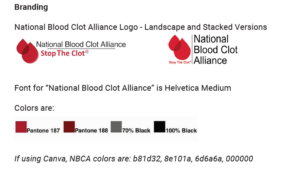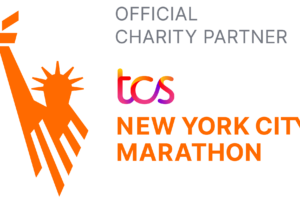Help us design our 2023 Blood Clot Awareness Month Shirt!
Link to logos and contest information: https://bit.ly/bcamshirt
Contest Guidelines:
- Design must incorporate the NBCA logo, Blood Clot Awareness Month, NBCA’s website (stoptheclot.org), and the year (2023).
- Must use only 1-3 colors
- T-shirt color will be white or grey
- NBCA will select 3 final designs and let the blood clot community vote on the winning design.
Prize:
Winning design will be selected as a fundraising incentive prize for the 2023 Reasons Challenge and will be available for purchase on our webstore. The winning designer will also receive a $100 Amazon gift card and free registration to the 2023 100,000 Reasons Challenge.
Logos and Color Guidelines:

Link to logos and contest information: https://bit.ly/bcamshirt
Below is some additional information about the National Blood Clot Alliance, Blood Clot Awareness Month, and the 100,000 Reasons Challenge that might help spark some creative ideas!
National Blood Clot Alliance
Mission Statement:
The National Blood Clot Alliance (NBCA) is a 501(c)(3), non-profit, voluntary health organization dedicated to advancing the prevention, early diagnosis and successful treatment of life-threatening blood clots such as deep vein thrombosis, pulmonary embolism, and clot-provoked stroke.
NBCA works on behalf of people who may be susceptible to blood clots, including, but not limited to, people with clotting disorders, atrial fibrillation, cancer, traumatic injury, and risks related to surgery, lengthy immobility, childbirth and birth control.
NBCA accomplishes its mission through programs that build public awareness, educate patients and healthcare professionals, and promote supportive public and private sector policy.
Organizational Tag Line: “We know the patient because we are the patient.”
Blood Clot Awareness Month
Blood Clot Awareness Month has long served as a significant time for NBCA to share life-saving information about blood clot risks, signs and symptoms, and prevention. It also serves as one of the most important times of the year for us to connect with the clotting and clotting disorders community. BCAM provides an opportunity for us to unite as a community to share resources and stories, and, most importantly, to share life-saving information about blood clots on a large and more far-reaching scale.
Read more about Blood Clot Awareness Month
100,000 Reasons Challenge
Challenge theme: anyBODY Can Get a Blood Clot
Blood clots do not discriminate. They can affect anyone, regardless of age, ethnicity, or race. The 100,000 Reasons Challenge was an event created by NBCA’s Sports and Wellness Institute to help support and promote NBCA’s life-saving programs and enhance the vision of creating a future in which fewer lives are lost to preventable blood clots. Participants of the Challenge can sign up to ride, run, walk, or move their body during this 31-day virtual challenge in March. The goal of the challenge is to raise $100,000 and reach 100,000 people in honor of the 100,000 lives that are lost each year to preventable blood clots.






